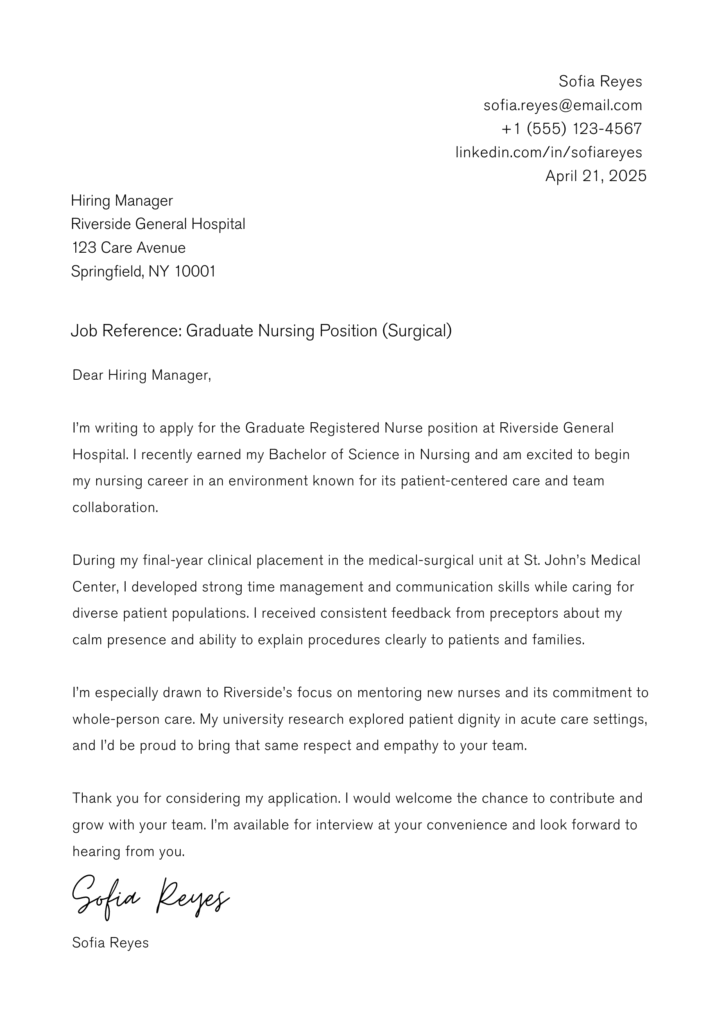By Sarah Johnson | Last updated April 2025

Writing your first nursing cover letter?
Feeling stuck because you don’t have experience yet?
Don’t worry—you’re not alone. In this guide, you’ll learn exactly how to write a professional, confident nursing graduate cover letter (even if you’ve never worked a shift). Includes real examples, templates, and recruiter-backed tips that work in 2025.
Table of Contents
Do Nursing Graduates Really Need a Cover Letter? Here’s Why It Matters
Even though some job applications don’t require a cover letter, including one as a new nurse can give you a real advantage—especially when you don’t have much experience yet.
According to the American Nurses Association, communication and professionalism are core nursing competencies employers look for—even in entry-level roles.
A resume shows your qualifications. A cover letter shows your personality, motivation, and communication skills. That’s what makes the difference when everyone applying has the same degree.
Cover Letter vs Resume: What New Nurses Need to Know
A cover letter gives you space to:
- Explain why you chose nursing in the first place
- Talk about the kind of environment or patient care that inspires you
- Highlight soft skills like empathy, communication, or teamwork
- Share something meaningful you experienced during your clinical training
It’s your chance to connect with the hiring manager on a human level—not just a checklist of skills.
When a New Nursing Graduate Cover Letter Makes the Biggest Difference
Cover letters are especially helpful when:
- You’re applying for a graduate nurse program, residency, or mentorship scheme
- The job ad asks for one (even as “optional”)
- You’re applying somewhere competitive, like a hospital with a strong reputation
- You want to explain something—like a career change, relocation, or gap between study and licensing
Even a short, well-written letter can show effort, maturity, and interest—qualities every healthcare employer values.
How to Write a Graduate Nurse Cover Letter With No Experience
If you’re not sure what to write, don’t worry—your letter doesn’t need to be long or complicated. It just needs four short paragraphs that explain who you are, why you’re applying, what you bring, and how to close with confidence.
Here’s a breakdown of exactly what to include:
Paragraph 1: A Confident Cover Letter Opening (With Example)
Start by clearly stating:
- The job title you’re applying for
- Where you found the listing (if relevant)
- A sentence showing genuine interest in the role or facility
Example:
I’m writing to apply for the Graduate Registered Nurse position at Sunrise Medical Center. I recently completed my Bachelor of Nursing and am passionate about delivering respectful, patient-centered care—especially in acute care settings like yours.
This sets the tone, shows enthusiasm, and gives context right away.
Paragraph 2: How to Show You’re Qualified—Even Without Experience
Now focus on:
- The clinical placements or hands-on training you completed
- Soft skills like calm under pressure, listening, or teamwork
- One or two quick examples from university or patient interactions
Tips:
- Don’t just say you’re “hardworking”—show it with a real example
- You can mention specific modules, patient populations, or simulation experiences
Example:
During my final-year placement in a surgical ward, I learned to manage patient care under pressure while communicating clearly with both patients and the care team. I received positive feedback for staying calm during fast-paced shifts and supporting older patients with compassion.
Paragraph 3: Why This Nursing Job Is the Right Fit for You
This is where you show that you’ve done a little homework.
Include:
- A line about the hospital or clinic’s values, patient focus, or specialties
- Something that aligns with your interests or goals as a new nurse
Example:
I’m especially drawn to your team’s emphasis on collaborative care and cultural sensitivity. My final-year project focused on improving communication with patients from diverse backgrounds, and I’d love to bring that same care to your medical-surgical unit.
Paragraph 4: How to Close Your Cover Letter Like a Pro
Wrap up by:
- Reaffirming your interest
- Mentioning your availability
- Thanking the reader
Example:
I’d be excited to learn more about this opportunity and how I can contribute to your team. I’m available for interview at your convenience and look forward to the chance to speak with you further. Thank you for your time and consideration.
Pro Tip: If it feels right, you can add a P.S. at the end to leave a memorable detail (e.g. “P.S. I’d love to contribute to your patient mentorship program—supporting first-time hospital patients was one of the most rewarding parts of my training.”)
Nursing Cover Letter Format: Simple Steps for a Professional Look
Once you’ve written your content, formatting it correctly helps your letter look professional and easy to read. Hiring managers often skim, so clear structure and spacing matter as much as the words you choose.
Here’s how to format your graduate nursing cover letter step-by-step:
Basic Layout Guidelines
- Length: Keep it to one page—3 to 5 short paragraphs
- Font: Use a clean, professional font like Arial, Calibri, or Times New Roman (size 11 or 12)
- Spacing: Use single spacing within paragraphs and a space between each section
- Alignment: Left-aligned with standard 1″ (2.54cm) margins
- File format: Save and send as a PDF (unless the job listing says otherwise)
Sites like Mayo Clinic Careers recommend a clean, one-page layout to keep applications scannable for hiring teams.
What to Include at the Top
Start with your details, followed by the hiring manager’s:
Your Info (top left corner):
First + Last Name Email Address Phone Number LinkedIn (optional)
Date:
Hiring Manager’s Info (if available):
Name Job Title Facility/Hospital Name Address
Recap: The Perfect New Grad Nursing Cover Letter Structure
Use this order every time:
- Opening paragraph – who you are and the role you’re applying for
- Why you’re a good fit – skills, placements, key strengths
- Why you want to work there – values, specialties, personal alignment
- Closing paragraph – availability and a thank you
Each paragraph should be short (3–5 lines) and easy to skim.
Final Presentation Tips
- Don’t use bold or colored fonts (keep it simple and professional)
- Proofread carefully—use Grammarly or read it out loud to catch errors
- Rename the file clearly:
Firstname_Lastname_NursingCoverLetter.pdf
Sample Nursing Graduate Cover Letter That Works
Here’s a full example of a nursing graduate cover letter you can learn from or adapt to your own application. It follows the exact structure we just covered: short, clear, and focused on strengths—not just experience.
Sample Cover Letter (New Nursing Graduate):
Dear Hiring Manager,
I’m writing to apply for the Graduate Registered Nurse position at Riverside General Hospital. I recently earned my Bachelor of Science in Nursing and am excited to begin my nursing career in an environment known for its patient-centered care and team collaboration.
During my final-year clinical placement in the medical-surgical unit at St. John’s Medical Center, I developed strong time management and communication skills while caring for diverse patient populations. I received consistent feedback from preceptors about my calm presence and ability to explain procedures clearly to patients and families.
I’m especially drawn to Riverside’s focus on mentoring new nurses and its commitment to whole-person care. My university research explored patient dignity in acute care settings, and I’d be proud to bring that same respect and empathy to your team.
Thank you for considering my application. I would welcome the chance to contribute and grow with your team. I’m available for interview at your convenience and look forward to hearing from you.
Sincerely, Sofia Reyes

Why This Letter Works
- Professional tone: Friendly, confident, and respectful
- Customised: Mentions the hospital’s values and aligns with its mission
- Experience-backed: Highlights specific clinical training and soft skills
- Easy to read: Clean formatting, clear structure, no filler
Template: Copy-and-Paste Cover Letter for Nursing Graduates
Not sure how to get started? Here’s a complete cover letter template you can copy and personalise for your own nursing job application. It’s written in a confident, clear style—perfect for new grads with limited experience.
Just swap in your own details where needed, and tweak the second and third paragraphs to reflect your placements and the hospital or clinic you’re applying to.
Nursing Graduate Cover Letter Template
Dear [Hiring Manager’s Name],
I’m writing to apply for the [Graduate Nurse Position] at [Facility Name]. I recently completed my [Bachelor of Science in Nursing] and am eager to begin my career in a setting known for [collaborative care / patient focus / professional development—choose what fits].
During my clinical placement at [Hospital/Unit Name], I worked closely with patients across [specialty or population, e.g. medical-surgical / aged care / paediatrics], building strong communication and time management skills. I was consistently recognised for [positive trait—e.g. calm under pressure / clear communication with families / team contribution].
I’m especially drawn to [Facility Name] because of your focus on [mention something specific—e.g. mentorship, cultural safety, innovation]. I’m passionate about delivering respectful, patient-centred care, and I’d be proud to grow as a nurse in your team.
Thank you for considering my application. I’m available for interview at your convenience and look forward to the opportunity to speak with you further.
Kind regards,
[Your Full Name]
[Email Address]
[Phone Number]
[LinkedIn profile – optional]
Tip: Don’t forget to update the job title, hospital name, and paragraph details to match each application. Even small tweaks can make your letter feel more genuine and tailored—and that effort really shows.
Common Covering Letter Mistakes New Nurses Make (And How to Fix Them)
Even with good intentions, it’s easy to fall into traps that make your cover letter feel generic, overly formal, or forgettable. Here are the most common mistakes nursing graduates make—and how to avoid them.
A 2023 NCSBN report found that over 60% of new nurses felt unprepared for the job search process—so clear, tailored communication is key.
1. Sounding Like a Personal Statement
Many grads reuse lines from their nursing school application, like:
“I’ve always wanted to help people and have been passionate about nursing since childhood.”
That may be true, but it’s too vague. Instead:
- Focus on your current skills, training, and goals
- Use examples that show how you act on that passion now (e.g. a meaningful placement experience)
2. Focusing Too Much on Learning
It’s common to write things like:
“I’m eager to learn and hope to grow with your team.”
There’s nothing wrong with being teachable—but don’t make learning the main point. Employers want to know:
- What you can offer now
- That you’re ready to handle responsibility (with support)
- That you understand their patients and workplace needs
3. Apologizing for Lack of Experience
Avoid saying:
“Even though I have no real-world experience…”
Instead, reframe it:
- Focus on what you’ve already done in clinicals or university labs
- Highlight how quickly you learn or how well you performed under supervision
4. Copy-Pasting the Same Letter Everywhere
Generic letters like:
“I’m applying for the nursing position at your hospital.”
…are easy to ignore. You’ll stand out more by:
- Mentioning the hospital/clinic by name
- Referring to their mission or specialty
- Adjusting your second paragraph to match the specific role
5. Forgetting the Human Touch
Overly formal language like:
“I am writing to express my sincere interest in the position of…”
…feels stiff. Instead:
- Use clear, professional—but natural—language
- Write like a competent human, not a robot
Pro Tips to Make Your Cover Letter Stand Out as a New Grad Nurse
Most nursing graduates will write similar things in their applications—so a few small touches can make your cover letter more memorable, human, and impactful.
Here are some simple ways to elevate your letter without overdoing it:
1. Mention Something Specific About the Employer
This shows you’ve done your homework and actually care where you work.
Examples:
- A recent award or news article
- Their values, mission, or patient care philosophy
- A specialty they’re known for that matches your interest
Example line:
“I’m especially drawn to your focus on trauma-informed care, which aligns with the work I did during my placement in a pediatric unit.”
2. Use a “P.S.” to Reinforce a Key Detail
This is subtle but powerful—it grabs attention after the signature block.
Example:
P.S. I’d love to contribute to your patient mentorship program—helping first-time hospital patients feel safe was one of the most rewarding parts of my training.
3. Mention Language Skills or Cultural Awareness
Especially helpful if the facility serves diverse communities.
Example:
“I’m fluent in both English and Spanish, which I’ve used to communicate effectively with patients and families during placements.”
4. Align Your Tone With the Role
- Formal hospital? Use a professional, respectful tone.
- Community clinic or pediatric practice? A warm, friendly tone may be more fitting.
Avoid overly stiff or overly casual writing—aim for clear and sincere.
5. Highlight a Specialty Interest (if known)
If you’re already leaning toward a field like emergency, mental health, or geriatric care, it’s okay to say so.
Example:
“I’m particularly interested in mental health nursing and completed a placement in a community psychiatric unit where I supported patients during group therapy sessions.”

FAQs: Writing a New Nursing Graduate Cover Letter
These are the most common questions new nurses ask when writing their first cover letter—and quick, clear answers to help you move forward with confidence.
1. What should a nursing graduate cover letter include?
A nursing graduate cover letter should include an introduction, a summary of clinical placements or skills, a paragraph explaining why you want the job, and a confident closing. Keep it to one page.
2. How do I write a cover letter with no nursing experience?
A nursing graduate cover letter should include an introduction, a summary of clinical placements or skills, a paragraph explaining why you want the job, and a confident closing. Keep it to one page.
3. Should new nurses write a cover letter?
Yes. A cover letter helps new nurses stand out by showing communication skills, professionalism, and motivation beyond what a resume can.
4. How long should a entry-level nurse cover letter be?
Keep it to one page with 3–5 short paragraphs. Use clear spacing, a professional font, and a tone that’s confident and sincere.
5. Can I use the same nursing cover letter for every job?
No. Use the same structure, but customize each letter to match the hospital or clinic. Mention their values or patient focus to show genuine interest.
Final Thoughts: You’re More Ready Than You Think
Writing your first nursing cover letter doesn’t have to be stressful. You don’t need years of experience or a perfect GPA to make a strong impression—you just need to show that you care, you’re capable, and you’re ready to learn.
Use your training, your placements, and your values to speak confidently about what you bring to a team. Tailor your letter to each role, keep it clear and human, and trust that your effort will stand out more than you think.
Next steps:
- Draft your letter using the example and structure above
- Proofread it carefully (or ask a friend to review it)
- Apply early, and follow up if you don’t hear back
- Keep practicing—writing gets easier with each application
If you’re switching careers into nursing, check out our career change cover letter guide for tailored tips and examples.
You’ve got this.
Written by Sarah Johnson, RN
Career Development Consultant | 10+ years helping new nurses land their first roles
Sarah brings hands-on clinical experience and a background in resume coaching for nursing graduates.
Reviewed by Harleen Kaur, RN, MSN
Clinical Nurse Educator | NCLEX Mentor & Nursing School Lecturer
Harleen ensures all clinical advice meets current nursing standards and licensure expectations.

